Saint Maud Blu-ray Movie
HomeSaint Maud Blu-ray Movie 
Blu-ray + Digital CopyLionsgate Films | 2019 | 84 min | Rated R | Nov 30, 2021
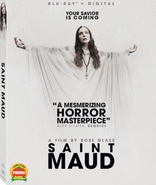
Movie rating
7 | / 10 |
Blu-ray rating
| Users | 0.0 | |
| Reviewer | 4.0 | |
| Overall | 4.0 |
Overview
Saint Maud (2019)
A pious nurse becomes dangerously obsessed with saving the soul of her dying patient.
Starring: Jennifer Ehle, Morfydd Clark, Turlough Convery, Lily Knight (II), Lily FrazerDirector: Rose Glass
| Horror | Uncertain |
| Psychological thriller | Uncertain |
| Mystery | Uncertain |
| Drama | Uncertain |
Specifications
Video
Video codec: MPEG-4 AVC
Video resolution: 1080p
Aspect ratio: 2.39:1
Original aspect ratio: 2.39:1
Audio
English: DTS-HD Master Audio 5.1
Subtitles
English SDH, Spanish
Discs
Blu-ray Disc
Single disc (1 BD)
Digital copy
Packaging
Slipcover in original pressing
Playback
Region A (locked)
Review
Rating summary
| Movie | 4.0 | |
| Video | 4.5 | |
| Audio | 4.5 | |
| Extras | 2.0 | |
| Overall | 4.0 |
Saint Maud Blu-ray Movie Review
Reviewed by Jeffrey Kauffman December 19, 2021The recently reviewed Devi from Satyajit Ray is a devastating deconstruction of the dangers of overly zealous religiosity and/or belief, in that particular case Hinduism. For those wanting a more Westernized Christian take on some of the same underlying ideas, Saint Maud might be a "good" place to start, albeit unlike the Ray film, this debut entry from writer and director Rose Glass traffics in horror aspects more overtly than Devi. The narrative in Saint Maud is also just a bit more disjunctive, which was probably done intentionally, but which can lead to a bit of uncertainty in terms of piecing together what exactly is going on, and what in fact went on prior to the film's main story to bring focal character Maud (Morfydd Clark) to the breaking point. Maud is a nurse who helps with so-called "palliative care", aiding those in the final days of their lives. She has been assigned to care for a woman named Amanda Köhl (Jennifer Ehle), a kind of Martha Graham type who was the toast of the dance world before cancer attacked her spine. She's largely confined to either her bed or her wheelchair now, and as a departing nurse informs Maud when Maud arrives at Amanda's rather luxe mansion, Amanda can be a bit of a -- well, let's just say problem, though the departing nurse uses a more colorful (and potentially objectionable) term.
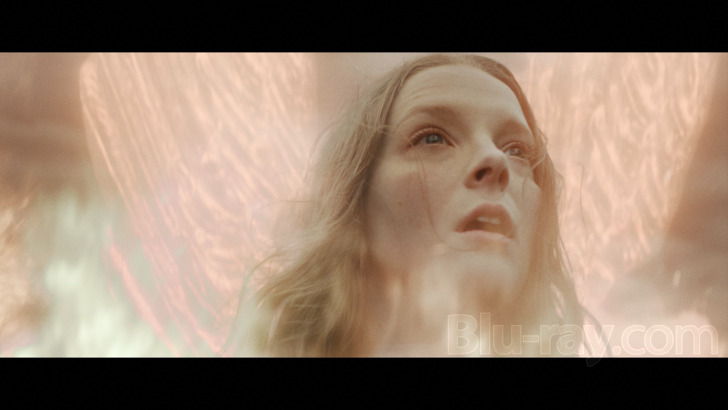
The film opens with a weird and disquieting vignette which is only elucidated, and then fairly opaquely, as the film progresses. In what appears to be a green tinged operating room, what may be a body lies on a gurney, while a bloodied nurse crouches in a corner, staring awestruck at a ceiling where a beetle is crawling. While some of the "making of" content on this disc mentions understandable linkages to the films of Roman Polanski (presumably Repulsion) and/or Ingmar Bergman (presumably Persona), there's arguably a much older cinematic referent which might occur to some in this sequence. Some presentational choices suggest that the bloodied nurse is almost a prisoner or even a patient in an insane asylum cell who seems to be close to worship of an insect, which may bring to mind another sadly afflicted person in similar circumstances, namely, the increasingly bizarre behaviors of one Renfield in Dracula. This opening vignette is an intentionally alarming way to begin the film (though the bug element turns up a bit later as well), so much so that when the much more tamped down narrative actually begins, there's a certain lurching quality to the proceedings in terms of tone.
Glass contributes a commentary track on this disc which gets into some of her desires for the film, and that includes wanting to kind of hint at a "haunted house" aspect in introducing Amanda's environment, when it's really a haunted psyche that turns out to be the threat. And it's here that Saint Maud offers some of its most provocative content, though some may feel as I did that things might have been established in a somewhat more straightforward manner. Suffice it to say Maud is probably suffering from a kind of post traumatic stress disorder, and as a result has become a really devout Catholic (so much so that Maud is an assumed name). There's recurrent voiceover by the character where she's explicitly in conversation with her creator, whom she just kind of assumes is there, listening, but whom she does kind of grudgingly "remind" that she's certain she's cut out for something greater than what she's been allotted in life. That is a rather interesting disconnect in terms of someone who feels "called" by some Divine voice, and in a way seems to hint that Maud feels she's being "taunted". Taunting, albeit right here on the physical plane by actual human beings Amanda and a probably paid lover named Carol (Lily Frazer) actually ends up creating problems for Maud, who ends up getting fired as a result.
The film has already documented Maud's tendency to become almost the Catholic equivalent of a Holy Roller, responding to a Divine presence with ecstatic undulations and contortions, and in fact she attempts to share some of her fervor with Amanda, who claims at least to have felt something. But Maud's belief is actually the source of the taunting from Amanda and Carol (and others gathered at a party for Amanda), and perhaps due to Maud's tendency to equate pain and punishment with being "observant", she reacts to her firing by beginning to mortify her flesh in some gruesome ways. The ultimately revealed backstory involving Maud's "former life" suggest that penance is an underlying psychological motivator for Maud, though Saint Maud begins to take this behavior to darker and darker places, which results in the film's calamitous last few minutes.
Saint Maud is often viscerally disturbing, and it's anchored by a really memorable performance from Morfydd Clark, who has a slightly "alien" look to her that was in some ways reminiscent to me of Noomi Rapace. Glass' writing attempts to get "inside" the character of Maud, and so the intentional disruption between an interior experience and how it "really" is in a supposedly objective reality is part and parcel of the structural conceit at play, and which probably unavoidably contributes to a certain wobbliness in narrative clarity. Glass' command of mood and technical aspects like production design are admirable and certainly augur for an exciting career.
Saint Maud Blu-ray Movie, Video Quality 
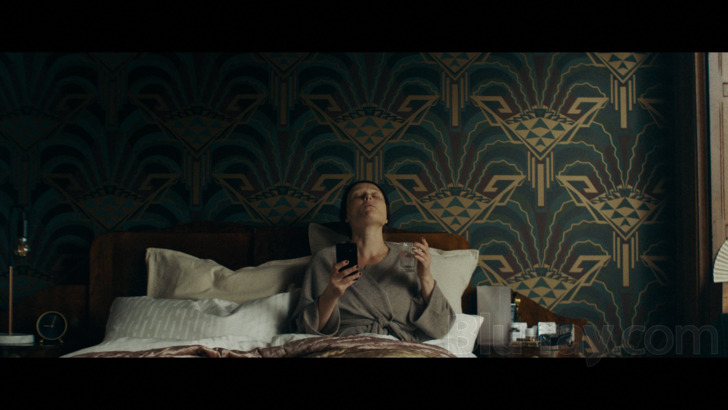
Saint Maud is presented on Blu-ray courtesy of Lionsgate Films with an AVC encoded 1080p transfer in 2.39:1. The IMDb lists Arri Alexa Mini cameras and a 2K DI as relevant data points (there's also some clear shots of Arri cameras in the making of featurette included on the Blu-ray as a bonus item). This is an interesting looking transfer, one that attempts to mimic a more traditionally "filmic" appearance at times, and which therefore has a bit more of an intentional texture rather than the smooth, glassy sheen that often accompanies digital capture. As can probably be gleaned in several of the screenshots I've uploaded to accompany this review, a lot of the film takes place in either dimly lit or drab environments, and in fact Glass in some of the supplements on this disc mentions how she wanted characters to repeatedly emerge from and disappear into shadows, which certainly occurs throughout the film. As such, shadow detail is a bit hazy at times, though perhaps by comparison, when the film briefly darts out of doors a couple of time during daytime, things pop really well. Detail levels are generally excellent throughout, offering precise renderings of some of the Deco inspired production design at Amanda's house. Glass talks about the cost of CGI these days, which may account for a relative dearth of the technique, but late in the film there are some special effects that are rather nice looking, if ultimately disturbing.
Saint Maud Blu-ray Movie, Audio Quality 
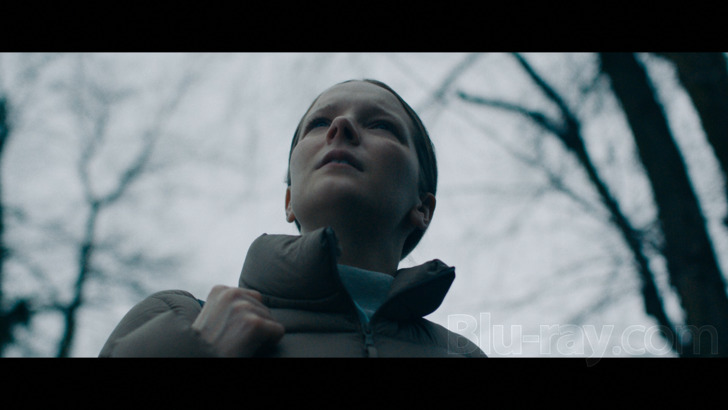
Saint Maud features a nice sounding DTS-HD Master Audio 5.1 track. The film benefits from an interesting score from Adam Janota Bzowski, which is admittedly not hugely innovative, but which still provides immersive washes of low end synths that pan through the surround channels and contribute mightily to a feeling of dread throughout the film. A lot of the story plays out as a virtual "two hander" between Amanda and Maud, and as such some surround activity can be limited to background ambient environmental effects, but in both some outdoor material as well as admittedly brief sequences like a climactic party where Maud understandably loses her cool, there is good engagement of the side and rear channels. Dialogue is rendered cleanly and clearly throughout. Optional English and Spanish subtitles are available, and one very brief English subtitle for one line delivered in Welsh right at the end of the film is forced.
Saint Maud Blu-ray Movie, Special Features and Extras 
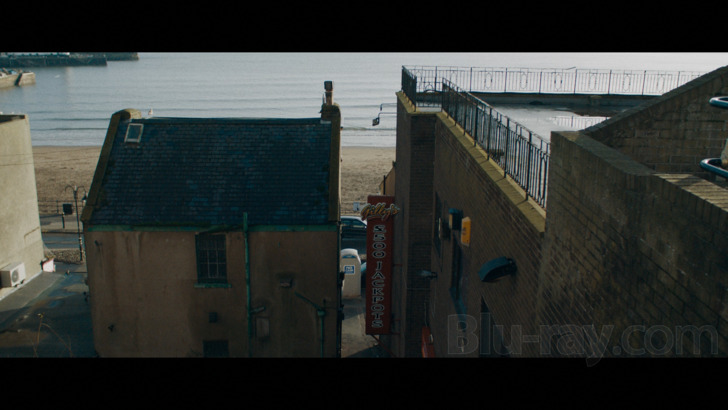
- Audio Commentary by Writer / Director Rose Glass is a sometimes halting affair, but has some interesting information. Glass is very soft spoken at times.
- A Higher Calling: The Rapture of Saint Maud (HD; 25:04) is an above average aggregation of interviews, behind the scenes footage and snippets from the film. There's a bit of biographical information about Glass, and Glass herself recounts a horrifying anecdote a friend shared with her which became the genesis for the traumatic memory afflicting Maud.
Saint Maud Blu-ray Movie, Overall Score and Recommendation 
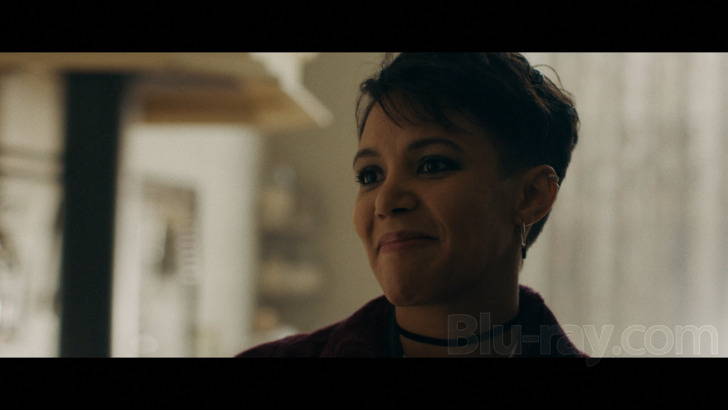
Those of you who keep up with releases for the UK market may have seen my relatively recent review for Dementer, a rather interesting independent horror film which kind of audaciously cast the writer and director's "special needs" sister as the object of a quasi-nurse's obsession, and which might make for an interesting double feature with this film. Saint Maud is probably more thought provoking than Dementer, though it shares some of that film's disjunctive narrative qualities. Rose Glass is certainly a talent to be reckoned with, and she was lucky to get viscerally effective performers like Morfydd Clark and Jennifer Ehle in her first feature film. Technical merits are solid, and the supplements, while not bounteous, are enjoyable. Recommended.
Similar titles
Similar titles you might also like

Hereditary 4K
2018

Lamb 4K
Dıriğ
2021

mother! 4K
2017

Rosemary's Baby 4K
55th Anniversary
1968

Goodnight Mommy
Ich seh, Ich seh
2014

The Shining 4K
1980

The Witch 4K
2015

Men
2022

A Cure for Wellness
2016

The Dreaming
1988

Santa Sangre 4K
1989

The Babadook
10th Anniversary Edition
2014

The Haunting of Molly Hartley
2008

Mr. Sardonicus
1961

Boogeyman
2005

Possession
2009

The Haunting of Bly Manor
2020

Doctor Sleep 4K
Includes Director's Cut on Standard Blu-ray
2019

Moon in Scorpio
1987

The Righteous
2021